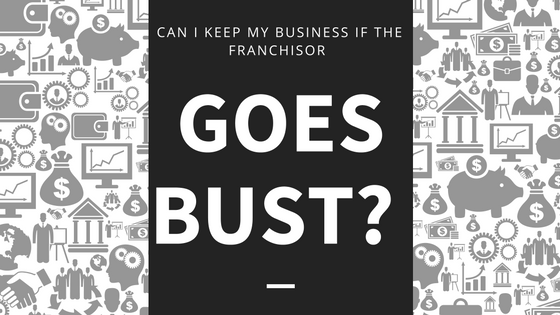
When a franchisee chooses to enter to a franchise their decision will be largely based on the reputation and success of that system. Unfortunately, even the most reputable systems can fail and franchisees can be left questioning whether they can keep their business. This situation has recently been highlighted through the current appointment of administrators to Eagle Boys, but of course Eagle Boys may work through the administration.
When a franchisor becomes bankrupt or has liquidators appointed (aka ‘goes bust’), the consequences will depend on the circumstances.
Who owns the IP
In most franchise systems the franchisor does not own the intellectual property. This is generally made up of the brand, trademarks, business names and other registered intellectual property to which value is attributed and goodwill has grown. A separate company (IP holding company) is usually set up for the sole purpose to own the intellectual property. The IP holding company will licence the use of the intellectual property to the franchisor. If the franchisor ‘goes bust’, then the IP holding company can sever the licence. This means that ownership of the IP is retained by the IP holding company and is protected, but the franchisor and franchisees effectively lose the right to use the intellectual property.
An option before signing the Franchise Agreement is to attempt to negotiate an agreement between the IP holding company and the franchisee covering the event of the franchisor failing. The IP holding company can step up and enter into an agreement, whether it be a licence or otherwise, with the franchisee enabling the franchisee to continue trading under the brand using the intellectual property in an attempt to minimise the disruption to the franchisee’s business.
What are the franchisee’s rights under the Franchise Agreement?
Franchise Agreements usually do not provide any rights for a franchisee if a franchisor becomes insolvent or fails in any other way. It is usually only the franchisor who has the right to terminate the Franchise Agreement if the franchisee becomes insolvent, bankrupt or the like.
If the franchisor does fail, and there is no agreement between the franchisee and IP holding company, then the franchisee will basically be in a position where they have to wait to see what happens.
It would be prudent to attempt to negotiate into a Franchise Agreement some sort of protection for the franchisee if the franchisor fails, for example the franchisee may continue to operate the franchised business using the intellectual property but not subject to the Franchise Agreement. Of course, agreements such as these can be set aside by administrators and liquidators.
There can also be a problem with obtaining goods and services if the franchisor is the supplier of those goods or services. The franchisee may be left with trying to source goods and services through other means. The franchisor may own some of the equipment used by the franchisee in their business and if so this may need to be returned and the franchisee obtain this equipment from elsewhere at the further cost of the franchisee.
If administrators and liquidators are appointed then they can disclaim onerous contracts including Franchise Agreements, leaving the franchisee with nothing. The liquidator or administrator may attempt to sell the whole of the franchise system in which case the franchisee will be effectively sold off to a new franchisor who may or may not know much about that franchised business and may just be a business investor. During the sale process the franchisee will continue to pay ongoing franchise and marketing fees to the liquidator, but will unlikely receive the support or see the marketing once provided by the franchisor in return.
If administrators and liquidators cannot find a purchaser for the system, then franchisees may be forced to close the doors and walk away from their businesses. If a business cannot use the brand and intellectual property, then the goodwill in the business is effectively lost. The franchisee may be able to continue operating their business under a new name, albeit on the basis that they do not use any of the franchise system’s intellectual property.
